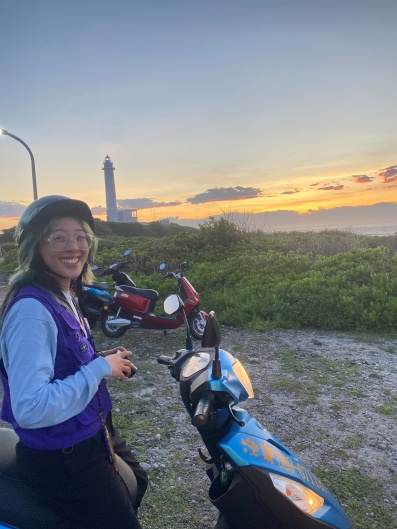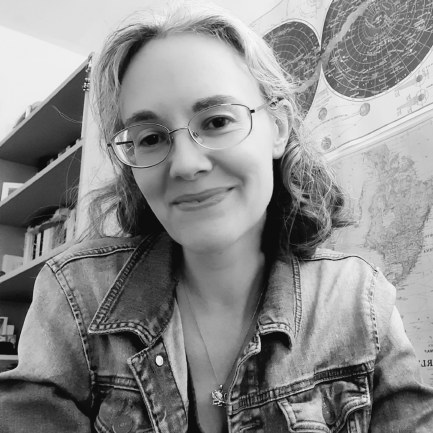The girl, undeterred by my watching, adds raspberry-frosted Pop-Tarts to a shopping cart. An aisle later, her mom finds the box, grabs her daughter by the arm, grumbles something in her ear, and places the Pop-Tarts on a shelf next to a box of gluten-free crackers. The girl, whose name I discovered on social media is Sophie, turns to me, crosses her eyes, and sticks out her tongue.
I watch as the white fingermarks on Sophie’s arm pink up, and I see her mother, my lover’s wife, the wife he never told me about, the wife who appeared one morning as a blue bubble of text on his phone, pick out his favorite 82% dark chocolate bar, the one that donates to endangered species, the same one I buy for him. The wife is wearing Lululemon leggings that accentuate her lithe frame and has her blonde hair pulled back into a careless ponytail. He told me he loved me for my curves and raven hair and the laugh lines around my eyes.
When I turn the corner in the dairy aisle, Sophie is opening a single-serving size of Organic Valley chocolate milk. She drains it and drops the empty carton next to a selection of organic, free-range eggs while my lover’s wife—I refuse to learn her name—reads the ingredients on a tub of Greek yogurt. Sophie flies me the bird and turns with a saucy flair of her private school skirt. When I told him I couldn’t have kids, he said he didn’t want any.
In the produce department, my lover’s wife gushes over the selection of kale—curly kale, dinosaur kale. The red Russian kale gets her hands flapping and her mouth orgasming. She chats with another yoga-clad shopper, discussing how sweet and tender the red Russian is, how beautiful its oak-shaped leaves, its colors ranging from blue-green to purple-red.
Meanwhile, Sophie switches the price tags of sweet potatoes and Okinawan sweet potatoes. Cucumbers and zucchini. She sidles up to me behind the pyramid of apples, and I can’t resist leaning in to catch a whiff of young adolescence-like onion wafting off her. She takes a bite out of a Honeycrisp and hisses, “Don’t think I won’t tell on you.”
But she won’t. She likes the game too much. This isn’t the first time I’ve followed Sophie and my lover’s wife around the grocery store and Sophie knows it. She’s getting more daring, more sassy with each visit and, still, I cannot stop imagining her as mine. My life as her mother. I imagine us going to the contemporary art museum. Playing tennis. Training a puppy to walk on a leash in the park. I’d be a good mother, I think, and she’d be a good daughter.
In line, eyes on mine, Sophie snags a Snickers off the rack at checkout and slides it onto the belt under a bunch of red Russian kale. I watch as my lover’s wife runs her credit card, smiles as the cashier hands her the receipt, and I see a woman, a wife, a mother. The Snickers is bagged without my lover’s wife seeing it, and, for a second, I think about ratting out Sophie. But I don’t, and Sophie smirks as she grabs the paper bag. When she gets to the door at the front of the store, Sophie turns to me and mouths, Perv.
The cashier has to call next twice before I place Lay’s potato chips, Ben & Jerry’s Chocolate Therapy, and Hostess Donettes on the belt. At the last go, I add a Snickers bar. When the cashier asks for a phone number to qualify for Safeway Club discounts, I give his—my soon-to-be ex-lover’s.
The cashier looks at the readout on her register and says, “Thank you, Mrs. Wilcox.”
 Kim Steutermann Rogers lives with her husband and 16-year-old dog Lulu in Hawaii. Her essay, “Following the Albatross Home” was recognized as notable in Best American Travel Writing. Her journalism has published in National Geographic, Audubon, and Smithsonian; and her prose in Gone Lawn, The Citron Review, Atticus Review, CHEAP POP, Hippocampus, and elsewhere. She was awarded residencies at Storyknife Writers Retreat in Alaska in 2016 and 2021 and Dorland Mountain Arts in 2022. Find her @kimsrogers.
Kim Steutermann Rogers lives with her husband and 16-year-old dog Lulu in Hawaii. Her essay, “Following the Albatross Home” was recognized as notable in Best American Travel Writing. Her journalism has published in National Geographic, Audubon, and Smithsonian; and her prose in Gone Lawn, The Citron Review, Atticus Review, CHEAP POP, Hippocampus, and elsewhere. She was awarded residencies at Storyknife Writers Retreat in Alaska in 2016 and 2021 and Dorland Mountain Arts in 2022. Find her @kimsrogers.


 Kim Steutermann Rogers lives with her husband and 16-year-old dog Lulu in Hawaii. Her essay, “Following the Albatross Home” was recognized as notable in Best American Travel Writing. Her journalism has published in National Geographic, Audubon, and Smithsonian; and her prose in Gone Lawn, The Citron Review, Atticus Review, CHEAP POP, Hippocampus, and elsewhere. She was awarded residencies at Storyknife Writers Retreat in Alaska in 2016 and 2021 and Dorland Mountain Arts in 2022. Find her @kimsrogers.
Kim Steutermann Rogers lives with her husband and 16-year-old dog Lulu in Hawaii. Her essay, “Following the Albatross Home” was recognized as notable in Best American Travel Writing. Her journalism has published in National Geographic, Audubon, and Smithsonian; and her prose in Gone Lawn, The Citron Review, Atticus Review, CHEAP POP, Hippocampus, and elsewhere. She was awarded residencies at Storyknife Writers Retreat in Alaska in 2016 and 2021 and Dorland Mountain Arts in 2022. Find her @kimsrogers.